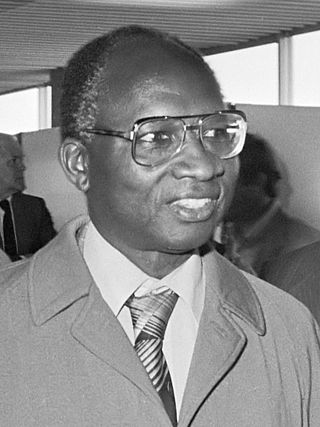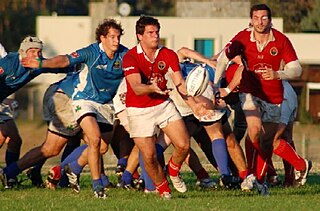Related Research Articles

Rugby football is the collective name for the team sports of rugby union or rugby league.

The Gambia, officially the Republic of The Gambia, is a country in West Africa. Geographically, The Gambia is the smallest country in continental Africa; it is surrounded by Senegal on all sides except for the western part, which is bordered by the Atlantic Ocean.

Sir Dawda Kairaba Jawara was a Gambian politician who served as Prime Minister from 1962 to 1970, and then as the first President of The Gambia from 1970 to 1994, when he was deposed.
The Japan Rugby Football Union is the governing body for rugby union in Japan. It was formed 30 November 1926, and organises matches for the Japan national team.

Senegambia, officially the Senegambia Confederation or Confederation of Senegambia, was a loose confederation in the late 20th century between the West African countries of Senegal and its neighbour The Gambia, which is almost completely surrounded by Senegal. The confederation was founded on 1 February 1982 following an agreement between the two countries signed on 12 December 1981. It was intended to promote cooperation between the two countries, but was dissolved by Senegal on 30 September 1989 after The Gambia refused to move closer toward union. The Senegambia Confederation should not be confused with the historic Senegambia region, generally shortened to the Senegambia.

Rugby union is a moderately popular sport in Canada; it is quite strong as a participation sport, particularly in several hotspots like British Columbia, Atlantic Canada, the West Island of Montreal, Quebec City and Ontario but does not attract the same level of spectator support yet, likely because the CFL's popular brand of Canadian Football is still similar to rugby in many ways, whilst also being the dominant football code in the country. Rugby Canada is the administrative body for rugby union in Canada. Every province also has its own union.

Rugby Africa is the administrative body for rugby union within the continent of Africa under the authority of World Rugby, which is the world governing body of rugby union. As of 2018, Rugby Africa has 37 member nations and runs several rugby tournaments for national teams, including the Africa Cup which is the main 15-a-side competition for African national teams.

Rugby union in Uruguay is considered a popular sport. The Uruguay national team, commonly known as Los Teros, have been playing international rugby since the late 1940s and have made appearances in five Rugby World Cups: 1999, 2003, 2015, 2019 and 2023.

Rugby union in Kenya is a popular sport, in particular due to the success of the Kenya national rugby sevens team in the rugby sevens format, and tournaments such as the Safari Sevens, which has been growing yearly, and now includes numerous international teams.

Rugby union in Japan is a moderately popular sport. Japan has the fourth largest population of rugby union players in the world and the sport has been played there for over a century. There are 125,000 Japanese rugby players, 3,631 official rugby clubs, and the Japan national team is ranked 12th in the world.

Rugby league is a full contact football code and spectator sport played in various countries around the world. It is govererned globally by the International Rugby League.

Rugby union in Ivory Coast is essentially amateur, with some degree of semi-professionalization in its top-flight league and the national rugby union team.
Rugby union in Madagascar is the most popular team sport in the nation. As of August 2023, Madagascar is ranked 45th worldwide by World Rugby (WR), and boasts over 42,540 registered players and more than 410 rugby clubs. Although Madagascar lacks a professional competition, as it is one of the poorest countries in the world, it does possess a national club competition that is extensively covered in the national print media, as well as having matches televised. Rugby is considered the national sport of Madagascar.

Rugby union in Poland is a moderately popular sport and currently, the Polish men`s national team are ranked 30th in the world as of 20th November 2022. The Poland women's rugby sevens team won the silver medal at the 2023 European Games behind Great Britain, progressing to the final 2024 Summer Olympic qualification tournament.

Rugby union in Zimbabwe is a popular sport and ranks after association football and cricket as one of the oldest and most popular sports in the country. The Zimbabwe national team, commonly known as the Sables, have been playing international rugby since the early 1900s and have made appearances in two Rugby World Cups Zimbabwe at the Rugby World Cup on two occasions. As with rugby union in Namibia, the country's lack of a professional structure, and opportunity for player's to earn an income playing rugby, has been a problem for national organisers.
Rugby union in Pakistan is a minor but growing sport.
Rugby union in Senegal is a moderately popular sport. The Senegal national team is currently ranked 54th by World Rugby.
Rugby union in Eswatini is a minor sport. As of January 2021, the World Rugby Ranking of their men's national team is 98th.
Rugby union in Egypt is a minor but growing sport.

The Gambia women's national football team represents the Gambia in international women's football. It is governed by the Gambia Football Federation. As of December 2019, it has only competed in one major international competition, the 2018 Africa Women Cup of Nations qualification. The Gambia has two youth teams, an under-17 side that has competed in FIFA U-17 Women's World Cup qualifiers, and an under-19 side that withdrew from regional qualifiers for an under-19 World Cup. The development of a national team faces challenges similar to those across Africa, although the national football association has four staff members focusing on women's football.